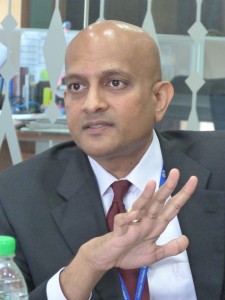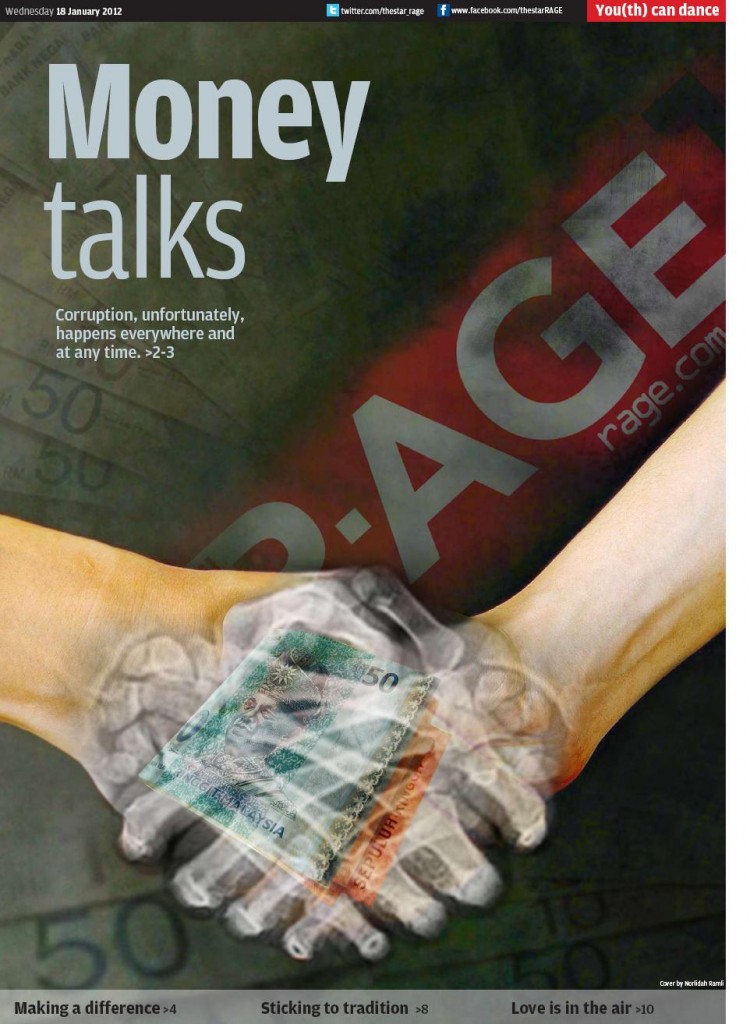By IAN YEE
alltherage@thestar.com.my
THE first thing that happened when Felix went for his driving lessons was not what he expected. Before he got any driving tips, any reassurances that he’d be fine or even any lecture on the importance of being responsible on the road, he was asked if he wanted to pay extra to guarantee that he would pass the test.
“It was the first thing the instructor asked me,” said Felix. “It was like nothing to him. When I met him for our first lesson, he told me if I paid an extra RM100, I wouldn’t have to worry about the test.”
Being a soft-spoken teenager faced with a difficult choice, and with the thought in the back of his mind that everyone else he knew had talked about the bribe, Felix decided to take the instructor’s offer.
And just like that, he had his first first-hand experience with corruption, like so many other young Malaysians across the country.
“I’m glad I paid (the bribe), too!” said Felix, who is a law student now.
“During the driving test, the lady was extremely unpleasant. She was telling me off about everything, even about the radio being too loud. And she told me to drive faster because she had other students waiting. I can’t imagine how much more difficult she would have been if I hadn’t paid!”
Felix reveals that all his friends paid the bribe. One local blogger even blogged about how she paid to get her driving licence.
“It’s almost like a part of the fee now, or part of the package when you sign up for lessons,” said Felix.
It won’t be his last encounter with corruption.
Many might just shrug it off as something you have to live with “being Malaysian”, but the long-term effects that corruption has on our society – not just in terms of values and principles but also the economy and our standard of living – would probably warrant a little more attention than that.
Growing problem
Ten years ago, Malaysia was ranked a creditable 33rd on Transparency International’s Corruption Perception Index (CPI). In 2010, we went down to number 58.
Today, we are at number 60 among 183 countries, with a CPI of 4.3 on a scale of one (highly corrupt) to 10 (very clean).
It’s not like we are not doing anything to stop the rot. Since the Malaysian Anti-Corruption Commission (MACC) was established in 2008, we have seen the Government make anti-corruption one of its National Key Result Areas (NKRA) and introduce the Whistleblower Protection Act.
Still, corruption remains a part of our daily lives.
Ravindran Devagunam, the anti-corruption NKRA director from the Performance Management & Delivery Unit (Pemandu), says some small businesses have reported using up to 8%-9% of their revenue base just on bribes, mostly on a variety of permit and licence applications.

PEMANDU's NKRA and NKEA director D. Ravindran says young people need to "step-up" to help reduce petty corruption in Malaysia.
“For an SME (small and medium enterprises), that’s a large amount. And SMEs account for 30%-40% of our total GDP,” said Ravindran.
Tough calls
At only 26, young business owner John has already seen quite a bit when it comes to corruption.
John started an interior design firm a couple of years ago with a few friends, and the reality of corruption kicked in very early on.
“We had to pay the officers who came to inspect our new office. They weren’t even cryptic about it. They just asked us straight up.
“It wasn’t a lot of money, just a couple hundred ringgit. But the bribe to put up the signboard was more – that’s why we don’t have one!” he said with a laugh.
All that do not even include the bribes they had to pay for the approval of some of their clients’ renovations, like when when they were looking to extend their houses. Those bribes usually cost several thousand ringgit, depending on how extensive the renovations were.
Luckily for John and his partners, it’s up to the client to decide whether or not to pay the bribe, and the cost of that is included in the final bill.
So far, though, not a single one of John’s clients have decided against paying the bribe.
“It just takes too long (if you decide not to pay). They’ll tell you that it would take, maybe two months, but if you pay up, your renovations will be approved in two weeks – and nobody wants to spend two months just sitting around waiting for their new home,” shared John.
For Ravindran, getting rid of corruption isn’t just about economic benefits. It’s also about creating a society with a strong set of values, which will in turn help the country develop further.
“If you’re talking about becoming a fully-developed nation where you have high income and good living, then you must have clean living, corrupt-free living.
“It’s very important that our young people have a sense of values, whether it’s basics like not littering or refusing to cut short on certain procedures,” he said.
Inefficiency, Ravindran says, is what causes corruption. If procedures and processes were efficient to begin with, there would be no need for people to pay bribes.
“After that it’s a chicken-and-egg thing. Inefficiency leads to corruption, and corruption leads to more inefficiency,” he said.
Making choices
The question, of course, is why do educated, forward-thinking young Malaysians still succumb to corruption?
According to college student Eda, 19, it has simply become the “norm”.
When she decided to not pay the bribe for her driving test, her friends advised her to think twice.
“It’s just because everybody’s doing it, so they think it’s acceptable; but I’m proud of myself for not paying, and I passed on my first try!” she said.
Eda believes that first experience at the driving test “opens a door” to corruption among young people.
“You’re not so scared about paying a bribe after that. Even when the police stops you at a road block, you’re not afraid of the situation,” she said.
But unlike Eda, young business owners like John are often left with no choice.
“When we started out as interior designers working for other people, the system was already this way. Everyone was paying the bribes, so we couldn’t afford not to.
“And let’s say we make a stand and we report someone – how long is the investigation going to take? How long will our clients have to wait? What happens if they found out it was us who made the report? Our business would be finished.”
John doesn’t see the end of corrupt practices in his field of work, unless and until the Government completely overhauls the “system”.
Ravindran, however, believes that for the time being, young people can still make a difference through social campaigns.
In India, an anonymous whistleblowing website called IPaidABribe.com has been set up to help the fight against corruption. People who have been pressured into paying bribes can use the website to report the people and the agencies who had solicited them.
The website then automatically updates a list to highlight the regions in India that are currently receiving the most reports of corruption, and how much money had been wasted on the bribes.
Ravindran is impressed by what the website has helped to achieve in India, and is hoping for young Malaysians to come up with their own ideas on how to fight corruption.
“These are the things young people can do. Speak up about it, write articles about it, talk about it on Twitter,” said Ravindran.
q Some names have been changed to protect their identity.



Tell us what you think!